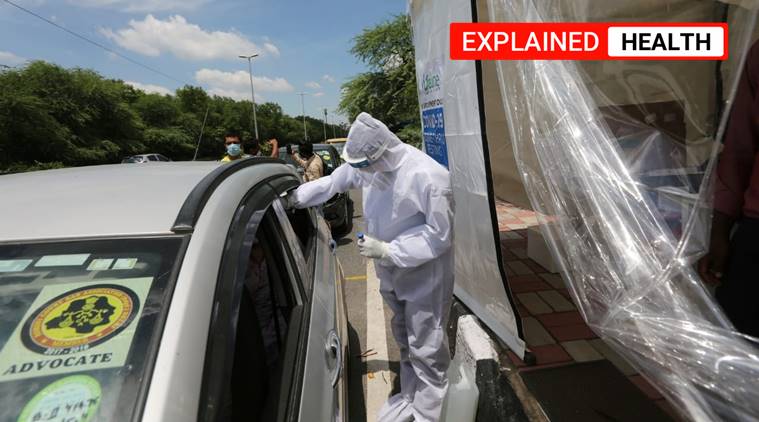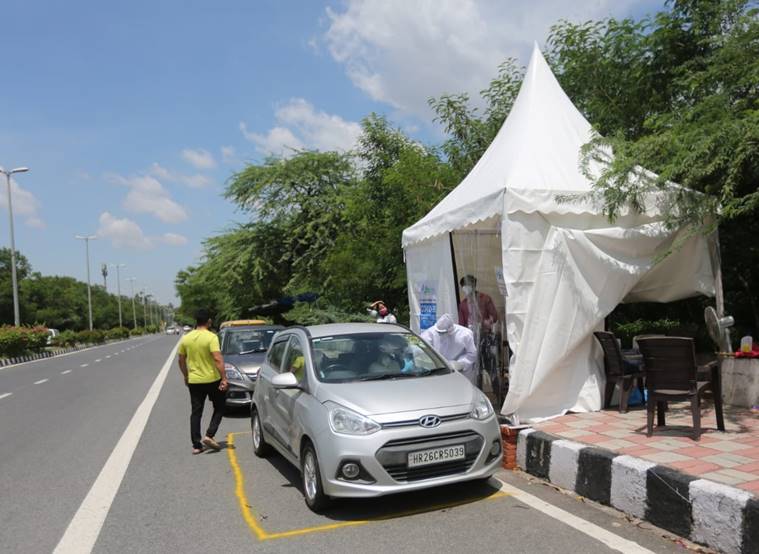
[ad_1]
, Edited by Explained Desk | New Delhi |
Published: August 9, 2020 4:59:11 pm
 A medical staffer conducts a Covid-19 test at a drive-in centre near Vasant Kunj in New Delhi on Thursday (Express photograph by Tashi Tobgyal)
A medical staffer conducts a Covid-19 test at a drive-in centre near Vasant Kunj in New Delhi on Thursday (Express photograph by Tashi Tobgyal)
As India ramps up its Covid-19 testing capacity, with Prime Minister Narendra Modi pledging one million tests per day over the next few weeks, several private labs identified by the ICMR have started drive-through centres for sampling — a method pioneered by South Korea for which it has received praise.
At the drive-through centres, passengers and drivers go through the entire Covid-19 testing process in a matter of minutes without ever having to get out of their vehicles. Besides limiting the exposure of frontline workers to the virus, the process also prevents asymptomatic patients from contaminating a public health facility.
So far, according to the Union Health Ministry, India has tested a total of 2,33,87,171 samples for Covid-19, with more than half a million tests being conducted daily.
How did the idea of drive-through Covid-19 testing centres come into being?
Way back in February 26, when Covid-19 was yet to be declared a pandemic, South Korea set up drive-through test stations as it focused on rapid and widespread testing to successfully blunt spread of the disease. The idea was inspired by the drive-through counters at McDonalds and Starbucks.
Thus, when cases started growing in March, South Korea had close to 50 drive-through centres, which screened more than 100,000 people. Results were relayed to the person in three days via SMS. The first drive-through test was implemented in Goyang, Gyeonggi province.
The test, which included registration, symptom check, swab sampling, and car disinfection, lasted 10 minutes on average for each person, whereas previous testing procedures took about 30 minutes. The government also launched an app that mapped all the drive-through test centres.
Following South Korea, such centres have sprung up in the US, the UK, France, Israel, South Africa, Ireland and Spain.
 The country’s first drive-through Covid-19 testing centre was set up in April in Delhi’s Punjabi Bagh by Dr Dang’s Lab (Express photograph by Tashi Tobgyal)
The country’s first drive-through Covid-19 testing centre was set up in April in Delhi’s Punjabi Bagh by Dr Dang’s Lab (Express photograph by Tashi Tobgyal)
How are Covid-19 tests conducted at drive-through centres?
The tests are conducted at the parking lot of the Covid-19 centre or lab, where a 30-40 metre-long stretch is turned into drive-through premises. The sample is collected with the patient sitting in his car itself. However, no two-wheelers or taxis are allowed.
For example, the drive-through centre of a testing lab in Delhi has four stations. At the first station, there is a banner with the lab’s name. At the second station, a personnel in personal protective equipment (PPE) checks the registration number, the colour and the make of the car as per the details submitted to the lab and the suspected patient’s ID.
At the third station, about 10 metres away, the car has to be parked inside a white box. This is placed next to a structure that has double-sided ventilation. Here the person is asked to roll down the window pane and tilt his/her head back. A medical officer in full PPE collects the swab sample from the throat and then another one from nose. At the fourth station, the vehicle is allowed to exit.
Where all in India have drive-through centres come up?
The country’s first drive-through Covid-19 testing centre was set up in April in Delhi’s Punjabi Bagh by Dr Dang’s Lab, one of the private labs allowed to test for coronavirus by ICMR. Around 20 minutes are allocated for one test and the lab can test 30-50 patients in a day. In May, SRL Diagnostics established such centers in Chandigarh, Gurgaon and Mumbai.
To get tested, a potential patient needs three things. First is a government ID such as Aadhaar card, passport etc, the second is a doctor’s prescription advising a Covid-19 test while the third is a patient proforma form.
What are the benefits?
Drive-through tests are more time saving than walk-in tests and ensures minimum exposure to both the patients and the sample collectors.
Moreover, since the person doesn’t have to leave the vehicle, it reduces the risk of spreading the infection in a testing centre or lab. It also is a safer option than home collections since people have apprehensions that the person coming to test must have gone to several houses to collect those samples
“Instead of waiting for reception to do patient intake and waiting for the patient to fill out paperwork and waiting for a nurse to come to your room, people are usually in and out of drive-through testing facilities in about 10 minutes,” Yvonne Maldonado, an infectious disease epidemiologist at Stanford University School of Medicine, explained the benefits of such a process to the Journal of the American Medical Association.
📣 The Indian Express is now on Telegram. Click here to join our channel (@indianexpress) and stay updated with the latest headlines
For all the latest Explained News, download Indian Express App.
© IE Online Media Services Pvt Ltd
[ad_2]
Source link